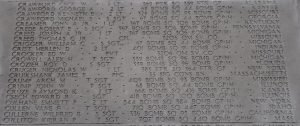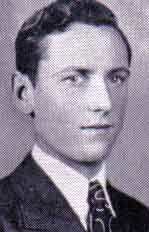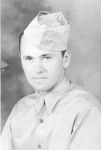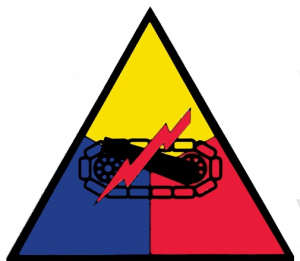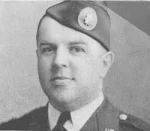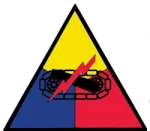Sgt. Edward Richard Csech was born in Forest Park, Illinois, on May 19, 1922, to Paul Csech and Paulina Rayner-Csech, and had one sister and two brothers. The family resided at 828 Marengo Avenue in Forest Park. Apparently, he thought about becoming a Catholic priest because he attended the School Mission House in Techny, Illinois. He changed his mind and graduated from Proviso Township High School, Maywood, Illinois, in 1940. He then went to work at the Nash Motor Company. On June 27, 1942, he registered with Selective Service and named his father as his contact person and indicated he was working for Montgomery Ward as a clerk.
He was drafted into the Army on October 16, 1942, and received the serial number 16 141 338. That day, he was sent to Camp Grant, Illinois, and on the 20th, he was sent to Jefferson Barracks, St. Louis, Missouri, where it appears he did his basic training. Because he had scored high on the Army General Classification Test he was given the opportunity to volunteer for the Army Air Corps. He was sent to Harlingen Army Airfield, Texas arriving on November 17th. He next sent to Lowery Field, Denver. Colorado, on December 29th. It is known there was gunnery school there and he qualified as a gunner. He next sent to Key Field, Mississippi, on March 10, 1943, and on June 27th, he went to Avon Park Airfield, Florida, Finally, he was sent to Salt Lake City Airfield, Utah, on July 11th.
At some point, he was assigned to the 418th Bombardment Squadron, 100th Bomb Group (Heavy), 8th Air Force, as a replacement for a man who had been lost during missions. He was a member the crew of B-17G # 42-31071. The members of the crew were: 1st Lt. Thomas F. Goupill, pilot; 2nd Lt. Tenvil H. Jackson, co-pilot; 2nd Lt. Gus J. Mink, navigator; 2nd Lt. Ralph Barker Jr., bombardier; S/Sgt. Robert E. Ramsay, radio operator; S/Sgt. Charles R. Gallagher, (TT) Engineer; S/Sgt. George J. Brassell, ball turret gunner and assistant radio operator; Sgt. James G. McLamb, right wing gunner, Edward was the left wing gunner; and Sgt. Fred Thompson, tail gunner. It not known if the crew was already in England or if the entire crew was replacing a lost B-17.
After it was consolidated, it became know for being ill-disciplined. It did intensive training at Wendover Field in Utah. In early 1943. the 100th Bomb Group was listed as operational. In May its personnel left the US for England and its planes were flown over the northern route to England and then were sent to Thorpe Abbotts, East Anglia, 90 miles northeast of London. It flew its first mission to Bremen, Germany on June 25th as part of a formation of 275 bombers. In all, it lost eighteen bombers and 180 men that day.
The 100th continued to fly missions over Germany for the next six months. On December 22, 1943, Edward’s plane was one of 53 planes sent to bomb targets in Munster, Germany. Apparently, his plane sustained damage and was losing altitude during the return trip to England and went down in the North Sea off the English coast. The body of one crew member, S/Sgt. George Brassell, washed ashore but the other men, including Edward, were listed as Missing in Action. No search was conducted to see if there were survivors of the crash since the assumption was made that the other crew members were killed in the crash or drowned at sea.
Paul Csech received a telegram from the War Department.
MR. PAUL CSECH
828 MARENGO AVENUE
FOREST PARK ILLINOIS
THE SECRETARY OF WAR DESIRES ME TO EXPRESS HIS DEEP REGRET THAT YOUR SON SERGEANT EDWARD R CSECH HAS BEEN REPORTED MISSING IN ACTION SINCE TWENTY TWO DECEMNER EUROPEAN AREA PERIOD IF FURTHER DETAILS OR OTHER INFORMATION ARE RECEIVED YOU WILL BE PROMPTLY NOTIED PERIOD
ULIO
THE ADJUTANT GENERAL
The telegram was followed by a letter.
Mr. Paul Csech
828 Marengo Avenue
Forest Park, Illinois
Dear Mr. Csech:
This letter is to confirm my recent telegram in which you were regretfully informed that your son, Sergeant Edward R. Cseach, 16, 141, 338, Air Corps, has been reported missing in action since 22 December 1943 over the European Area.
I know that added distress is caused by failure to receive some information or details. Therefore, I wish to assure you that at any time additional information is received it will be transmitted to you without delay, and, if in the meantime no additional information is received, I will again communicate with you at the expiration of three months. Also, it is the policy of the Commanding General of the Army Air Forces upon receipt of the “Missing Air Crews Report” to convey to you any details that might be contained in that report.
The term “missing in action” is used only to indicate that the whereabouts or status of an individual is not immediately known. It is not intended to convey the impression that the case in closed. I wish to emphasize that every effort is exerted continuously to clear up the status of our personnel. Under war conditions this is a difficult task as you must readily realize. Experience has shown that many persons reported missing in action are subsequently reported prisoners of war, but as this information is furnished by countries with which we are at war, the War Department is helpless to expedite such reports. However, in order to relieve financial worry, Congress has enacted legislation which contains in force pay, allowances and allotments to dependents of the personnel being carried in a missing status.
Permit me to extend to you my heartfelt sympathy during this period of uncertainty.
Sincerely yours,
(signed)
J. A. ULIO
Major General
The Adjutant General.
A Finding of Death was made on December 24 1944, and his father was sent another letter telling him that his son was being declared dead. The exact content of the letter is not know. After the war, Sgt. Edward R. Csech’s name was placed on the Walls of the Missing, Cambridge American Cemetery, Cambridge, England.
